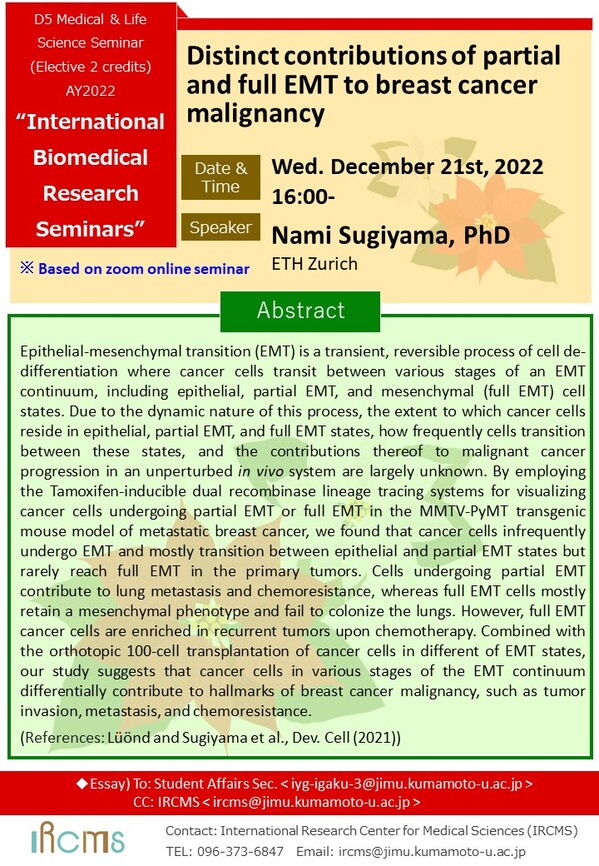- HOME
- News & Events
- [Dec. 21] D5 Seminar-Dr. Nami Sugiyama (ETH Zurich)
News & Events
[Dec. 21] D5 Seminar-Dr. Nami Sugiyama (ETH Zurich)
December 7 2022
The "D5 Medical & Life Science Seminar" course will be offered by International Research Center for Medical Sciences (IRCMS). It will run from May 2022 to March 2023, with lectures given by scientists who are affiliated with IRCMS or in collaboration with researchers at IRCMS. The lectures will be given once a month, in English, and by leading scientists in the relevant research field. Students will be taught: 1) how normal physiological functions are maintained in the human body; 2) how these systems become abnormal under certain pathophysiologic conditions; 3) why stem cells are important in animal development and homeostasis; 4) how stem cell-based approaches can help us understand disease mechanisms and find potential cure for diseases related to stem cell malfunction (e.g., cancer, aging).
Anyone who wants to join is welcome.
For students who have registered for the course, please check your attendance in Moodle.
Date : December 21, 2022 (Wednesday)
Time : 16:00 -
* Zoom online seminar
Speaker : Dr. Nami Sugiyama PhD
ETH Zurich
Title : Distinct contributions of partial and full EMT to breast cancer malignancy
Abstract :
Epithelial-mesenchymal transition (EMT) is a transient, reversible process of cell de-differentiation where cancer cells transit between various stages of an EMT continuum, including epithelial, partial EMT, and mesenchymal (full EMT) cell states. Due to the dynamic nature of this process, the extent to which cancer cells reside in epithelial, partial EMT, and full EMT states, how frequently cells transition between these states, and the contributions thereof to malignant cancer progression in an unperturbed in vivo system are largely unknown. By employing the Tamoxifen-inducible dual recombinase lineage tracing systems for visualizing cancer cells undergoing partial EMT or full EMT in the MMTV-PyMT transgenic mouse model of metastatic breast cancer, we found that cancer cells infrequently undergo EMT and mostly transition between epithelial and partial EMT states but rarely reach full EMT in the primary tumors. Cells undergoing partial EMT contribute to lung metastasis and chemoresistance, whereas full EMT cells mostly retain a mesenchymal phenotype and fail to colonize the lungs. However, full EMT cancer cells are enriched in recurrent tumors upon chemotherapy. Combined with the orthotopic 100-cell transplantation of cancer cells in different of EMT states, our study suggests that cancer cells in various stages of the EMT continuum differentially contribute to hallmarks of breast cancer malignancy, such as tumor invasion, metastasis, and chemoresistance.
(References: Lüönd and Sugiyama et al., Dev. Cell (2021))
Flyer: (Click to enlarge)

